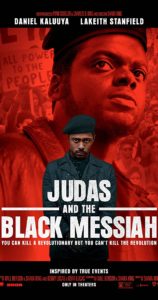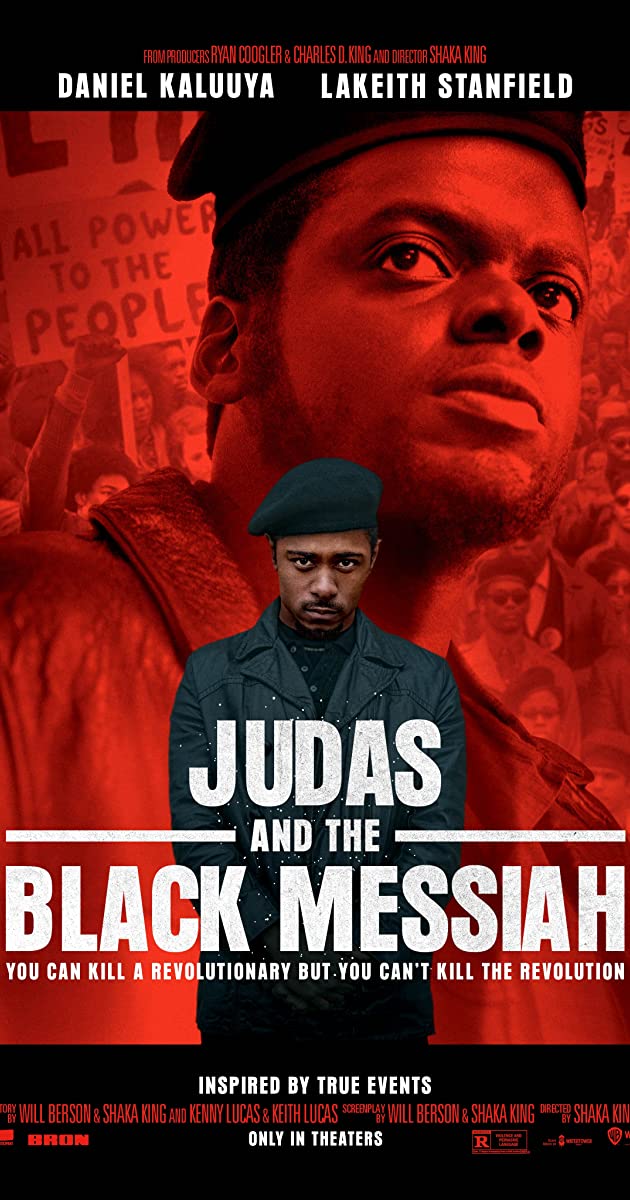 Judas and the Black Messiah is one of those movies you should watch, even if you don’t really want to. It’s another stark reminder of how the FBI operated under a racist and reactionary J. Edgar Hoover during the 1960s, and a stark reminder of why it’s never a good idea to 100% trust government spin. File those FOIAs! Judas and the Black Messiah tells the true story of Fred Hampton (Daniel Kaluuya, Get Out, Queen & Slim), the Chairman of the Illinois Black Panther Party who was gunned down by law enforcement during an overnight raid in 1969, after a fateful betrayal by FBI informant Bill O’Neal (Lakeith Stanfield, Sorry to Bother You). The movie is filled with excellent performances – even if the material itself is far from entertaining.
Judas and the Black Messiah is one of those movies you should watch, even if you don’t really want to. It’s another stark reminder of how the FBI operated under a racist and reactionary J. Edgar Hoover during the 1960s, and a stark reminder of why it’s never a good idea to 100% trust government spin. File those FOIAs! Judas and the Black Messiah tells the true story of Fred Hampton (Daniel Kaluuya, Get Out, Queen & Slim), the Chairman of the Illinois Black Panther Party who was gunned down by law enforcement during an overnight raid in 1969, after a fateful betrayal by FBI informant Bill O’Neal (Lakeith Stanfield, Sorry to Bother You). The movie is filled with excellent performances – even if the material itself is far from entertaining.
While Kaluuya’s Hampton is a powerful orator and captivating presence, Stanfield’s Bill O’Neal is certainly the more complex as the “Judas” in this story. O’Neal was a career criminal given a choice by FBI handler Roy Mitchell (Jesse Plemons) to infiltrate the Black Panther organization in Chicago and report back, or face several years in prison for car theft and impersonating a federal officer. O’Neal takes the deal, and rises in the ranks as a trusted comrade in the Black Panther organization, and supposed friend to Hampton and his girlfriend Deborah Johnson (Dominique Fishback). She was nine months pregnant with Hampton’s son when he was gunned down at the age of 21. What ultimately happened to her, Fred Hampton Jr., and O’Neal is revealed in an interesting post script at the end of the film.
No matter where you land personally on the ideology and tactics of the revolutionary Black Panther Party, there’s no doubt Hoover (an almost unrecognizable Martin Sheen) and the FBI abused their power and authorized what amounted to Hampton’s assassination.
I was not familiar with Hampton’s story. I’ve always associated Black Panther leadership with the likes of Malcolm X or Bobby Seale (who I learned more about in The Trial of the Chicago 7). So, I’m glad I saw Judas and the Black Messiah, even if it is a bit of a slow, tough watch. And I’d venture to guess that H.E.R’s anthem “Fight for You” – featured in the film – has more than a fighting chance of winning an Oscar for Best Original Song.
Arty Chick’s take: I knew something of Hampton’s story from a great documentary, The Black Panthers: Vanguard of the Revolution , which I highly recommend. It’s the best film I’ve seen about the Panthers and the FBI’s (or more precisely J. Edgar Hoover’s) racist campaign to destroy them. It painted Hampton as a much more charismatic man, though it tells a lot of the same story with a lot more depth. It didn’t reveal the FBI informant though, and while that is an interesting side story, I wasn’t really invested in this telling. It is a slow build and doesn’t feel like it’s really focused on either story. The performances are certain top notch. And I have to say I was impressed with the cinematography and music. All in all it’s an important addition to the history of the Panthers, and as it is about the systemic racism that is still with us, it’s well worth a watch.
Judas and the Black Messiah hits theaters and starts streaming exclusively on HBO Max on Feb. 12.

